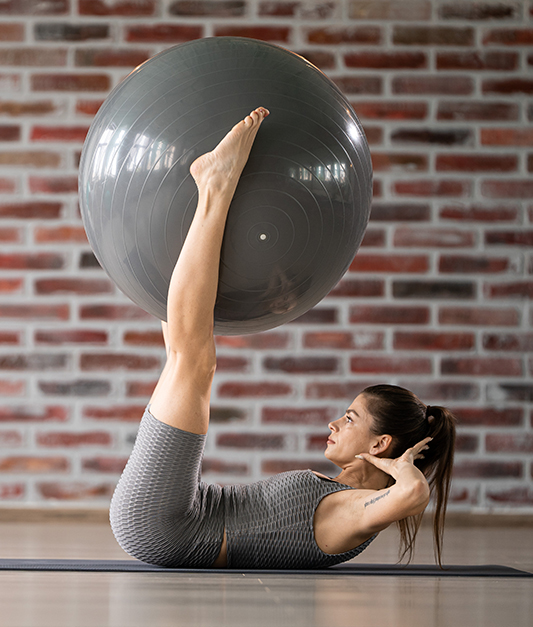Are you ready to take your fitness to the next level? Understanding the key aspects of well-rounded fitness can change the way you feel, move, and live every day.
It’s not just about hitting the gym or running miles—it’s about balancing strength, flexibility, endurance, and more. When you focus on all these areas, your body works better, you avoid injuries, and your energy stays high. Keep reading to discover the simple but powerful elements that will help you build a stronger, healthier you.

Credit: www.youtube.com
Components Of Well Rounded Fitness
Well rounded fitness means taking care of different parts of your body. It is not just about running or lifting weights. True fitness includes many important areas. Each part helps your body work better and stay healthy. Understanding these components helps create a good workout plan.
Focusing on all areas keeps your body strong, flexible, and ready for daily tasks. This balance lowers the risk of injury and improves overall health. Below are the key components of well rounded fitness.
Cardiovascular Health
Cardiovascular health improves how your heart and lungs work. It helps your body use oxygen better. Activities like walking, running, or cycling build this health. Good cardiovascular fitness gives you more energy. It lowers the chance of heart problems and keeps blood flowing well.
Strength Training
Strength training builds muscle and bone power. It helps with daily tasks like lifting or carrying. Using weights or body weight improves muscle tone. Strong muscles protect joints and prevent injuries. This type of training also boosts metabolism and supports healthy weight.
Flexibility And Mobility
Flexibility lets your muscles stretch easily. Mobility means moving joints through their full range. Both are important for smooth, pain-free movement. Stretching and gentle exercises increase flexibility and mobility. They reduce stiffness and improve posture. This keeps your body feeling younger and more agile.
Balance And Coordination
Balance helps you stay steady and avoid falls. Coordination lets your body parts work well together. These skills are important for sports and everyday activities. Exercises like standing on one foot or using a balance board help. Good balance and coordination improve overall body control and confidence.
Nutrition For Fitness
Nutrition plays a vital role in achieving well-rounded fitness. Eating the right foods fuels your body for workouts and recovery. Proper nutrition supports muscle growth, energy levels, and overall health. Understanding key nutrition aspects helps improve fitness results effectively.
Macronutrient Balance
Your body needs a mix of macronutrients: proteins, fats, and carbohydrates. Proteins build and repair muscles. Carbohydrates provide energy for exercise. Healthy fats support brain function and hormone balance. Balancing these nutrients helps maintain strength and stamina. Avoid extremes and focus on variety in your meals.
Hydration Importance
Water is essential for every body function. It regulates temperature and keeps joints lubricated. Dehydration can cause fatigue and reduce workout performance. Drink water regularly throughout the day. Increase intake before, during, and after exercise. Staying hydrated speeds up recovery and prevents cramps.
Meal Timing
When you eat matters as much as what you eat. Eating before exercise provides energy for better performance. A small snack 30 to 60 minutes before workouts works well. After exercise, eat protein and carbs to aid muscle repair. Regular meals help keep energy steady all day long.
Recovery Strategies
Recovery strategies are vital for balanced fitness. They help your body heal and grow stronger. Without proper recovery, workouts can lead to injury and fatigue. Recovery improves performance and keeps you motivated. Understanding key recovery methods can enhance your fitness journey.
Rest And Sleep
Rest is the foundation of recovery. Your muscles repair themselves during rest periods. Sleep plays a crucial role in this process. Aim for 7 to 9 hours of quality sleep each night. Good sleep helps reduce muscle soreness and boosts energy. Avoid screens and loud noises before bedtime to improve sleep quality.
Active Recovery
Active recovery means light exercise on rest days. Activities like walking, swimming, or gentle stretching help blood flow. This movement clears out waste from muscles. It also reduces stiffness and speeds up healing. Active recovery prevents your body from becoming too stiff or weak.
Injury Prevention
Preventing injury is part of smart recovery. Warm up before workouts to prepare your muscles. Use proper form to avoid strain and pain. Listen to your body and stop if you feel sharp pain. Regularly stretch tight muscles to keep flexibility. Injury prevention keeps your fitness progress steady.

Credit: www.michelleporterfit.com
Goal Setting And Motivation
Goal setting and motivation are essential parts of well-rounded fitness. They guide your efforts and keep you on track. Without clear goals, workouts can feel aimless. Motivation fuels your desire to keep moving forward. Both work together to create lasting fitness habits.
Setting Realistic Goals
Choose goals that match your current fitness level. Avoid setting targets that feel too hard or too easy. Realistic goals help you build confidence and avoid burnout. Break big goals into smaller steps. This makes progress easier to see and achieve.
Tracking Progress
Keep a record of your workouts and improvements. Use a journal or an app to note your progress. Tracking shows how far you have come. It also helps spot areas needing more work. Celebrate small wins to stay encouraged.
Staying Motivated
Find reasons why fitness matters to you. Focus on benefits like feeling stronger or having more energy. Change your routine to keep it interesting. Surround yourself with supportive people. Remind yourself that every effort counts. Motivation can rise and fall. Keep pushing, even on tough days.
Incorporating Variety
Incorporating variety in your fitness routine keeps your body active and engaged. It prevents boredom and helps you avoid plateaus. Trying different exercises challenges various muscle groups. It also improves overall fitness and keeps workouts fun.
Cross Training Benefits
Cross training means doing different types of exercise. It helps balance muscle strength and improves endurance. This reduces the risk of injury. You can combine running, cycling, and swimming for a full-body workout. Cross training also boosts your fitness level faster.
Mixing Workouts
Mixing workouts adds excitement to your routine. Change the order or type of exercises often. Try strength training one day and yoga the next. This approach helps your body recover and grow stronger. Mixing workouts also stops your muscles from getting used to one type.
Adapting To Changes
Your fitness needs change over time. Adapt your workouts to fit your current goals and lifestyle. Change intensity, duration, or type of exercise as needed. This keeps your routine effective and interesting. Adapting helps you stay motivated and avoid burnout.

Credit: gymsource.com
Frequently Asked Questions
What Defines A Well-rounded Fitness Routine?
A well-rounded fitness routine combines strength, cardio, flexibility, and balance exercises. This approach improves overall health, endurance, and mobility. It prevents injury and promotes long-term fitness consistency. Including diverse workouts targets different muscle groups and energy systems effectively.
How Important Is Strength Training In Fitness?
Strength training builds muscle, boosts metabolism, and enhances bone density. It supports daily activities and prevents age-related muscle loss. Including strength exercises twice a week improves body composition and functional strength. This makes it a crucial part of well-rounded fitness.
Why Include Flexibility Exercises In Fitness Plans?
Flexibility exercises improve joint mobility and reduce injury risks. They enhance posture and muscle coordination. Regular stretching or yoga aids recovery and decreases muscle stiffness. Flexibility training complements strength and cardio for balanced fitness.
How Does Cardiovascular Training Benefit Overall Fitness?
Cardiovascular training strengthens the heart and lungs, boosting endurance. It helps burn calories and supports weight management. Regular cardio improves energy levels and reduces chronic disease risks. It’s essential for a complete fitness program.
Conclusion
A well-rounded fitness plan builds strength, endurance, and flexibility. It also includes balance and good nutrition. Rest and recovery play important roles too. These parts work together to keep your body healthy. Staying consistent helps you see steady progress. Small steps add up over time.
Fitness is a journey, not a quick fix. Focus on all key aspects for lasting results. Your body will thank you. Keep moving forward, one day at a time.
